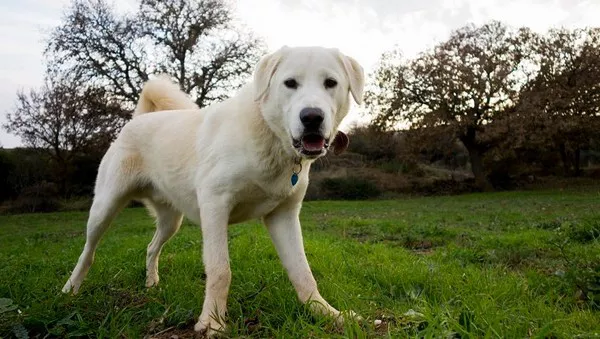An Akbash dog is a large and powerful breed known for its history as a livestock guardian. Originating in Turkey, these dogs have been bred for centuries to protect livestock such as sheep and goats from predators like wolves and bears. They are recognized for their distinctive appearance, characterized by a strong build, a thick white coat, and a noble, confident demeanor.
1.Key Characteristics of Akbash Dogs:
Size and Appearance: Akbash dogs are large and sturdy, with males typically weighing between 90 to 130 pounds (40 to 59 kg) and females weighing around 75 to 105 pounds (34 to 48 kg). They stand at a height of 28 to 34 inches (71 to 86 cm) at the shoulders. Their most recognizable feature is their white coat, which helps them blend with their flock and protects them from the sun.
2.Temperament:
While often mistaken for aggressiveness due to their protective nature, Akbash dogs are actually known for their calm and intelligent temperament. They are bred to be independent thinkers, making decisions on their own to protect their charges. Their loyalty to their family and the animals they guard is unparalleled.
3.Guardian Instincts:
As livestock guardian dogs, Akbash dogs have a strong protective instinct. They are wired to detect and deter potential threats to the livestock under their care. This natural vigilance might lead to behaviors that some might misinterpret as aggression, but it’s important to understand that this is a fundamental part of their role.
4.Socialization:
Proper socialization from an early age is crucial for Akbash dogs. Exposing them to various people, animals, and situations helps them differentiate between true threats and everyday occurrences. Early socialization plays a significant role in shaping their behavior and ensuring they are well-adjusted companions.
5.Exercise Needs:
Despite their size, Akbash dogs do not have extremely high exercise needs. They are not overly energetic, but they do benefit from regular walks, playtime, and mental stimulation. A bored Akbash dog might exhibit undesirable behaviors, so engaging them in appropriate activities is essential.
6.Living Environment:
While traditionally used in rural settings to protect livestock, Akbash dogs can adapt to various living environments. However, they are better suited to homes with large yards or rural areas where their guarding instincts can be put to good use. They might not be the best choice for apartment living due to their size and need for space.
7.Health Considerations:
Like all breeds, Akbash dogs have their share of potential health concerns. Hip dysplasia, a condition where the hip joint doesn’t develop properly, is relatively common in larger breeds, including Akbash dogs. Regular veterinary check-ups, a balanced diet, and maintaining a healthy weight can contribute to their overall well-being.
8.Grooming:
Despite their thick coat, Akbash dogs have relatively low grooming requirements. Their coat naturally sheds dirt and debris, and their dense undercoat helps regulate their body temperature. Regular brushing to remove loose fur and occasional baths are usually sufficient to keep their coat in good condition.
9.Historical Significance:
The history of Akbash dogs is intertwined with their role as protectors of livestock in the rugged landscapes of Turkey. Their name “Akbash” translates to “white head” in Turkish, reflecting their distinct appearance. These dogs have played an essential role in preserving herds and flocks from predators, contributing to the livelihood of farmers and shepherds.
10.Preservation Efforts:
With the modernization of farming practices, the traditional role of Akbash dogs as livestock guardians has evolved. However, efforts are being made to preserve their unique genetic heritage and ensure their continuation. Breed enthusiasts and organizations work towards maintaining the breed’s characteristics while also adapting them to new roles as loyal companions and guardians.
In summary, Akbash dogs are a remarkable breed with a rich history as dedicated guardians of livestock. Their protective nature, intelligence, and loyalty make them unique and valuable companions for those who understand and appreciate their innate qualities. To ensure a harmonious relationship with an Akbash dog, prospective owners should invest time in training, socialization, and understanding the breed’s characteristics.


